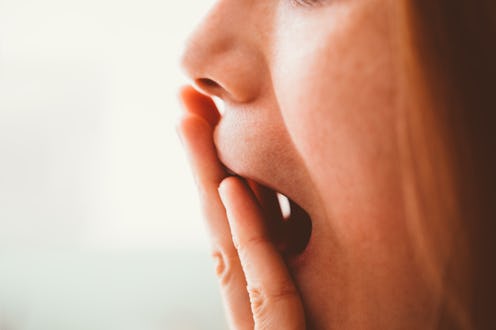Life
How To Beat DST Fatigue

Enjoy your last few hours of sleep, because on March 12, 2017 at 2am, we'll all be springing forward, or turning the clocks ahead one hour. That means, you guessed it, we all lose an hour of sleep. It seems like only yesterday I was writing about Daylight Saving Time and how we'd all gain an hour of sleep and everything would be right in the world. Where has the time gone? Anyway, as you can imagine, losing an hour of sleep can cause a whole slew of health issues, including fatigue. So I'm going to round up a few solutions for how to beat DST fatigue, because nobody likes to be sleepy and unfocused.
DST fatigue doesn't just make you tired, though — it can cause more serious health problems. Of course, being sleepy can make you less alert, which can pose a serious danger if you're driving, for instance. But it can have much more grave consequences — studies have shown that your risk of suffering a heart attack increases the first three days after DST ends. So it's especially important to practice self-care next week. Here are a few ways you can beat the fatigue.
1Get Moving
I know the last thing you want to do when you're tired is exert more energy, but paradoxically, it will actually make you feel more energetic. It will also improve the efficiency of your heart, lungs, and muscles, according to WebMD. Plus, as Elle Woods famously said, exercise gives you endorphins and endorphins make you happy. So the bottom line is just get moving, no matter how much you'd prefer to stay in bed.
2Hydrate
If you don't already know that water is basically a miracle elixir that solves all your problems, it's about time you learn. If you're feeling groggy, reach for a glass of water before you grab another coffee — dehydration can cause fatigue and decreased alertness and concentration. So down some water and then wait a little bit — it can take up to 45 minutes from the time you drink water before you actually feel hydrated.
3Eat Some Energy-Boosting Foods
Brown rice, sweet potatoes, honey, bananas, oranges — all have been proven to give you a natural energy kick in various ways. Don't reach for an energy bar or some candy; pack a healthy snack instead.
4Get Some Sunshine
If you can, soak up some sunshine for 15 to 20 minutes — like by taking a walk around the block, for example. Vitamin D, which you can absorb by spending time in the sun, can help reduce daytime sleepiness, according to research. But don't overdo it, and make sure to wear sunscreen, because too much sun can make you feel nauseated and dehydrated, among other things.
5Stand Up
If you're sitting at a desk all day, it's super important to get off your butt regularly. I mean that literally, by the way — sitting too long causes your blood vessels to constrict, which makes you feel tired even if you've gotten enough sleep. So get up out of your chair, stretch a bit, take a walk around the office.
6Take A Deep Breath
I've already covered how taking a deep breath can help you focus, but it turns out it can also help put a little pep in your step too. Doctors recommend doing an exercise where you inhale for six counts, hold your breath in for three counts while tensing your muscles, and then release for six counts while relaxing your muscles. Hold your breath out for three counts, and repeat. It should perk you up a little.
7Up Your Magnesium Intake
If you have a magnesium deficiency, it could be making you sluggish. Studies have shown that people who aren't consuming enough magnesium in their diets had higher heart rates and required more oxygen to do physical tasks than they did after their magnesium levels were back to normal. In other words, if you have a magnesium deficiency it takes you more energy to do the things you'd normally do. Almonds, hazelnuts, cashews, whole grains, and certain fish like halibut are all rich in magnesium.
8Have A Power Snack
Your ideal snack should have a combination of protein, fat and fiber to give you the proper energy boost between meals and prevent crashing. Yogurt with a handful of nuts (like our magnesium-rich friends, almonds), or peanut butter on a whole wheat cracker are some good choices.
9Take A Power Nap
If you have the opportunity, taking a short power nap — I'm talking between 10 and 30 minutes — can improve memory, improve your ability to problem solve, reduce feelings of fatigue, and more. Basically, power naps are amazing and there's a reason everyone loves naps. Just don't nap for more than half an hour, otherwise you risk waking up even groggier than you were before you passed out.
10Go To Bed A Half Hour Earlier
If you try to go to bed an hour earlier to combat the hour we lose this weekend, you'll probably be lying there with your eyes wide open because your body is all confused. Instead, try going to bed 15 minutes earlier each night. It's a lot more manageable.